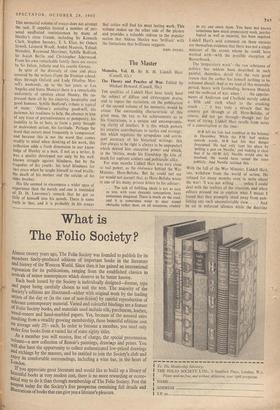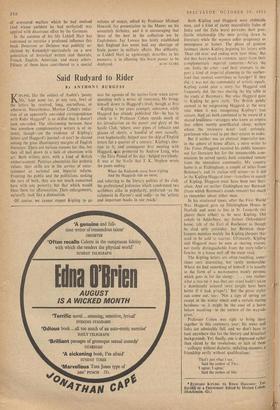The Master
The Theory and Practice of War. Edited by Michael Howard. (Cassell, 50s.)
THE qualities of Liddell Hart have lately been the subject of diffuse and extravagant praise, and to repeat the recitation, on the publication of the second volume of his memoirs, would be otiose. The outstanding characteristic of this great man, the key to his achievements as to his frustrations, is a unique and uncompromis- ing clarity of intellect. It is this which powers his creative contributions to tactics and strategy; this which regulates the scrupulous and astrin- gent accuracy of his historical writings; this (for always to be right is always to be unpopular) which denied him executive power and which, in the 'thirties, made his friendship the kiss of death for aspirant soldiers and politicians alike.
For nine months Liddell Hart was very close to real power, as the eminence behind the War Minister, Bore-Belisha. But he could not see (or would not accept) that, as Hore-Belisha wrote in one of his many private letters to his adviser: . . . The task of fulfilling ideals is not so easy
as you, with your dynamic conceptions, have sometimes imagined. There is much on the road, and it is sometimes wiser to steer round obstacles rather than, on all occasions, crudely
to try and crush them. You have not known
sometimes how much preparatory work, psycho-
logical as well as material, has been required. Liddell Hart's acid comment on these excuses are themselves evidence that there was not a single minister of the crown whom he could have worked with—with the possible exception of Beaverbrook.
The `preparatory work'—the raw substance of politics--has seldom been described in such painful, shameless, detail (for the very good reason that the author has himself nothing to be ashamed about). And as we read of this miserable period, heavy with foreboding, between Munich and the outbreak of war, when '. . . the appoint- ments of Anderson and Chatfield merely added a fifth and sixth wheel to the creaking coach . . ,' it was truly a miracle that the country got through at all. Hore-Belisha, of course, did not get through—though not for want of trying. Liddell Hart recalls from notes of a conversation at the time: H-B felt his fate had trembled in the balance in December. While the P.M. had spoken smooth words, H-B had felt that danger threatened. He had only kept his place by 'pulling a gun on Neville.' and making it clear that if he (H-B) fell, Neville would also be involved. He would • have raised the issue publicly. And Neville realised this. . . .
With the fall of the War Minister, Liddell Hart, too, withdrew from the world of action. He refused for many months even to write about the war: 'I was not willing . . . unless I could deal with the realities of the situation, and when editors pressed me to explain what I meant I found that they promptly shied away from pub- lishing any such uncomfortable view. . . .' And he sat in enforced idleness while the doctrine
of armoured warfare which he had evolved (and whose antidote he had perfected) was applied with disastrous effect by the Germans.
In the autumn of his life Liddell Hart has continued, to exercise a profound influence (his book Deterrent or Defence was publicly ac- claimed by Kennedy)—particularly on a new generation of historical writers and theorists, French. English, American, and many others. Fifteen of them have contributed to a special
volume of essays, edited by Professor Michael Howard, for presentation to the Master on his seventieth birthday, and it is encouraging that three of the best in the collection are by Englishmen. Jay Luvaas has lately established that England has never had any shortage of brain power in military affairs. Her difficulty, as Liddell Hart so agonisingly describes in his memoirs, is in allowing this brain power to be







































 Previous page
Previous page